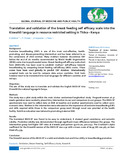Translation and validation of the breast feeding self efficacy scale into the Kiswahili language in resource restricted setting in Thika – Kenya

Date
2017Author
Mituki, D.M.
Tuitoek, Prisca J.
Varpolatai, A.
Taabu, I.
Metadata
Show full item recordAbstract
Background
Exclusive breastfeeding (EBF) is one of the most cost‐effective, healthpromoting,
and disease‐preventing intervention and has been referred to as
the cornerstone of child survival. Many mothers however discontinue EBF
before the end of six months recommended by World Health Organization
(WHO) some due to psychosocial issues. Breast feeding self‐efficacy scale‐short
form (BSES‐SF), has been used to establish mothers’ self‐efficacy towards
breastfeeding by computing breast feeding self‐efficacy (BSE) scores. These
scores have been used globally to predict EBF duration. Internationally
accepted tools can be used to compare data across countries. Such tools
however need to be translated into local languages for different countries and
set‐ups.
Objectives
The aim of the study was to translate and validate the English BSES‐SF into
Kiswahili the national laguage in Kenya.
Methods
The study was a pilot study within the main cluster randomized longitudinal study. Pregnant women at 37
weeks gestation were randomly placed into, intervention (n=21) and comparison (n=21) groups. The BSES‐SF
questionnaire was used to collect data on BSE at baseline and another questionnaire used to collect socioeconomic
data. Mothers in the intervention were educated on the importance of exclusive breastfeeding (EBF)
and skills required while those in the comparison group went through usual care provided at the health
facility. Nutrition education was tailored to promoting maternal BSE.
Results
The translated BSES‐SF was found to be easy to understand, it showed good consistency and semantic
validity. Predictive validity was demonstrated through significant mean differences between the groups. The
intervention group had higher EBF rates at 6 weeks post‐partum (χ2=6.170, p=0.013). The Cronbach’s alpha
coefficient for the Kiswahili version of the BSES‐SF was 0.91 with a mean score of 60.95 (SD ±10.36), an item
mean of 4.354.
Conclusion
The Kiswahili version of the BSES‐SF is a valid and reliable tool and it has utility in breastfeeding promotion.
